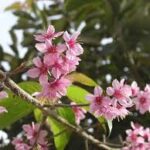
In today’s fast-paced world, stress and anxiety have become prevalent issues affecting millions of people globally. With the rising demand for natural and holistic approaches to mental health, plants like Rosa cymosa have garnered attention for their therapeutic properties. Commonly known as the Seven Sisters rose, Rosa cymosa is not only celebrated for its ornamental beauty but also for its potential benefits in alleviating stress and anxiety. This article delves into the various ways Rosa cymosa can be incorporated into stress and anxiety therapy, examining its chemical properties, traditional uses, and modern applications.
#### Introduction to Rosa cymosa
**Botanical Profile**
Rosa cymosa, a member of the Rosaceae family, is a climbing shrub native to East Asia, particularly China and Japan. It is characterized by its clusters of small, fragrant white to pink flowers that bloom in early summer. The plant produces red hips in the autumn, which are rich in vitamins and have been used in traditional medicine for centuries.
**Historical and Traditional Uses**
Traditionally, Rosa cymosa has been utilized in East Asian medicine for its various health benefits. The flowers, leaves, and hips have been used to make teas, tinctures, and topical preparations aimed at treating a range of ailments, including digestive issues, inflammation, and skin conditions. The calming fragrance of the flowers has also been appreciated for its soothing effects on the mind.
### Chemical Properties and Therapeutic Potential
**Active Compounds**
Rosa cymosa contains several bioactive compounds that contribute to its therapeutic potential. These include flavonoids, essential oils, tannins, and vitamins. Each of these compounds plays a role in promoting relaxation and reducing anxiety.
– **Flavonoids:** These are known for their antioxidant properties and ability to modulate neurochemical pathways associated with mood regulation.
– **Essential Oils:** The aromatic compounds found in Rosa cymosa essential oil have been shown to have calming effects on the nervous system.
– **Tannins:** These have astringent properties and can help in reducing inflammation and promoting overall health.
– **Vitamins:** Particularly vitamin C, which is abundant in the hips, contributes to overall health and well-being.
### Methods of Using Rosa cymosa in Stress and Anxiety Therapy
#### Aromatherapy
**Essential Oil Extraction**
One of the primary ways Rosa cymosa can be used in stress and anxiety therapy is through aromatherapy. The essential oils extracted from its flowers are rich in compounds that can induce relaxation and reduce stress.
**Application Techniques**
– **Diffusion:** Using a diffuser to disperse the essential oils into the air can create a calming environment. Inhaling the aroma can help reduce stress and anxiety levels.
– **Inhalation:** Direct inhalation of Rosa cymosa essential oil from a bottle or inhaler stick can provide immediate relief from anxiety.
– **Topical Application:** Diluting Rosa cymosa essential oil with a carrier oil and applying it to pulse points, such as the wrists and temples, can promote relaxation.
**Scientific Evidence**
Research has shown that aromatherapy using essential oils can significantly reduce stress and anxiety. Studies on similar rose species have indicated that their essential oils can lower cortisol levels and enhance mood. While specific studies on Rosa cymosa are limited, its chemical profile suggests similar benefits.
#### Herbal Teas and Infusions
**Preparation of Rosa cymosa Tea**
The petals and hips of Rosa cymosa can be dried and used to make herbal teas. These teas are not only pleasant in flavor but also rich in compounds that support mental health.
**Health Benefits**
– **Calming Effects:** Drinking Rosa cymosa tea can have a soothing effect on the nervous system, helping to alleviate anxiety.
– **Antioxidant Properties:** The antioxidants present in the tea can reduce oxidative stress, which is often linked to anxiety and depression.
– **Vitamin C Boost:** The high vitamin C content can help boost the immune system and overall vitality, indirectly supporting mental health.
**Dosage and Consumption**
For optimal benefits, it is recommended to drink 2-3 cups of Rosa cymosa tea daily. The tea can be consumed hot or cold, depending on preference.
#### Topical Applications and Skincare
**Rosa cymosa in Skincare**
Stress and anxiety often manifest physically, affecting skin health. Rosa cymosa can be incorporated into skincare products to address these issues.
**Product Types**
– **Creams and Lotions:** Infused with Rosa cymosa extracts, these products can be applied to the skin to promote relaxation and improve skin health.
– **Bath Soaks:** Adding Rosa cymosa petals or essential oil to bathwater can create a soothing experience, relieving stress and promoting relaxation.
**Benefits for Skin Health**
– **Anti-inflammatory:** The anti-inflammatory properties can help reduce skin redness and irritation caused by stress.
– **Hydrating:** Rosa cymosa’s moisturizing properties can improve skin hydration, making it an excellent addition to skincare routines.
### Integrative Therapy Approaches
#### Combining Rosa cymosa with Other Therapies
**Holistic Stress Management**
To enhance the effectiveness of Rosa cymosa in stress and anxiety therapy, it can be combined with other holistic practices such as yoga, meditation, and acupuncture.
**Case Study: Integrative Stress Reduction Program**
In an integrative stress reduction program, participants used Rosa cymosa essential oil during yoga and meditation sessions. The combination of physical exercise, mindful practices, and the therapeutic aroma of Rosa cymosa resulted in significant reductions in self-reported stress and anxiety levels.
**Guidelines for Integrative Use**
– **Consistency:** Regular use of Rosa cymosa in combination with other therapies is key to achieving long-term benefits.
– **Personalization:** Tailoring the combination of therapies to individual needs and preferences can enhance the overall effectiveness.
### Psychological and Emotional Benefits
#### Enhancing Mood and Emotional Well-being
**Mood Regulation**
The bioactive compounds in Rosa cymosa can positively influence the brain’s chemistry, helping to regulate mood and reduce feelings of anxiety.
**Emotional Balance**
Regular use of Rosa cymosa, whether through aromatherapy, tea, or topical application, can contribute to emotional balance and stability.
**User Testimonials**
Many individuals who incorporate Rosa cymosa into their daily routines report feeling more relaxed, balanced, and emotionally resilient.
#### Support in Therapeutic Settings
**Therapist Recommendations**
Mental health professionals can recommend Rosa cymosa as a complementary therapy for clients dealing with stress and anxiety. Its natural properties make it a suitable adjunct to traditional therapeutic approaches.
**Client Experiences**
Clients who use Rosa cymosa in conjunction with traditional therapy often experience enhanced relaxation and a greater sense of well-being. Testimonials highlight improvements in sleep quality, mood, and overall stress levels.
### Future Research and Potential Developments
#### Ongoing Studies
**Scientific Investigations**
Ongoing research is exploring the full range of Rosa cymosa’s therapeutic potential. Studies are examining its effects on neurotransmitters, hormone levels, and overall mental health.
**Potential Discoveries**
Future discoveries may reveal additional compounds in Rosa cymosa that contribute to its calming effects, further solidifying its role in stress and anxiety therapy.
#### Innovative Applications
**Product Development**
Innovative applications of Rosa cymosa are being developed, including supplements, advanced skincare formulations, and functional foods designed to support mental health.
**Market Trends**
As consumer interest in natural and holistic health products grows, Rosa cymosa is likely to become a popular ingredient in the wellness industry.
### Conclusion
Rosa cymosa offers a multifaceted approach to managing stress and anxiety, leveraging its rich chemical profile and traditional uses. From aromatherapy and herbal teas to topical applications and integrative therapy approaches, this versatile plant provides numerous pathways to enhance mental well-being. As research continues to uncover its full potential, Rosa cymosa is poised to become a valuable component of natural stress and anxiety therapies. By incorporating Rosa cymosa into daily routines and therapeutic settings, individuals can harness its calming properties to navigate the challenges of modern life with greater ease and resilience.
### Exploring the Therapeutic Potential of Rosa cymosa in Stress and Anxiety Management (Part 2)
In the first part of our exploration, we discussed the botanical profile of Rosa cymosa and its chemical properties relevant to stress and anxiety management. We also examined various methods of utilizing Rosa cymosa, including aromatherapy, herbal teas, and skincare applications. In this second part, we will delve deeper into integrative therapy approaches, psychological benefits, and future research directions related to Rosa cymosa’s role in stress and anxiety therapy.
### Integrative Therapy Approaches
#### Combining Rosa cymosa with Mindfulness Practices
**Mindfulness Meditation**
Mindfulness meditation involves focusing attention on the present moment without judgment, which can be enhanced with the use of Rosa cymosa aromatherapy.
**Practice Guidelines**
– **Setting the Environment:** Creating a calm and soothing environment conducive to meditation, incorporating Rosa cymosa essential oil diffusers or scented candles.
– **Inhalation Techniques:** Encouraging deep and mindful inhalation of Rosa cymosa aroma during meditation sessions to promote relaxation and mental clarity.
**Clinical Applications**
Therapists may recommend mindfulness practices augmented with Rosa cymosa aromatherapy to clients experiencing stress and anxiety. The combination can facilitate deeper states of relaxation and promote emotional well-being.
#### Yoga Therapy with Rosa cymosa
**Yoga Asanas**
Yoga involves physical postures (asanas), breathing techniques (pranayama), and meditation practices aimed at harmonizing the body, mind, and spirit. Incorporating Rosa cymosa aromatherapy during yoga sessions can enhance the therapeutic benefits.
**Breathing Exercises**
Pranayama, or yogic breathing exercises, can be combined with inhalation of Rosa cymosa essential oil to deepen relaxation and alleviate tension.
**Case Study: Yoga and Aromatherapy Integration**
In a clinical study, participants engaged in a six-week yoga program supplemented with Rosa cymosa aromatherapy. Pre- and post-program assessments revealed significant reductions in perceived stress levels and improvements in overall well-being among participants.
### Psychological and Emotional Benefits
#### Stress Reduction and Resilience Building
**Stress Management Strategies**
Incorporating Rosa cymosa into stress management routines can enhance coping mechanisms and resilience in the face of life’s challenges.
**Emotional Regulation**
Regular exposure to Rosa cymosa aromatherapy or consumption of Rosa cymosa tea can promote emotional balance and stability by modulating neurotransmitter activity in the brain.
**Client Feedback**
Clients who integrate Rosa cymosa into their stress management practices often report feeling more grounded, centered, and capable of handling stressors effectively.
#### Supportive Role in Therapeutic Settings
**Complementary Therapy**
Mental health professionals may recommend Rosa cymosa as a complementary therapy alongside traditional counseling or psychotherapy interventions.
**Therapeutic Alliance**
Collaborating with clients to incorporate Rosa cymosa into their treatment plans can strengthen the therapeutic alliance and empower clients in their healing journey.
### Future Research Directions
#### Neurobiological Mechanisms
**Neurotransmitter Modulation**
Further research is needed to elucidate the specific neurobiological mechanisms through which Rosa cymosa exerts its anxiolytic effects, particularly its modulation of neurotransmitter activity.
**Brain Imaging Studies**
Functional magnetic resonance imaging (fMRI) and positron emission tomography (PET) studies could provide insights into the neural correlates of Rosa cymosa’s therapeutic effects on stress and anxiety.
#### Clinical Trials and Efficacy Studies
**Randomized Controlled Trials (RCTs)**
Large-scale RCTs are needed to evaluate the efficacy of Rosa cymosa compared to standard treatments for stress and anxiety disorders.
**Longitudinal Studies**
Long-term follow-up studies could assess the sustained effects of Rosa cymosa interventions on mental health outcomes and relapse prevention.
#### Cross-Cultural Studies
**Global Perspectives**
Exploring Rosa cymosa’s therapeutic use in diverse cultural contexts can provide valuable insights into its universal applicability and cultural relevance.
**Traditional Knowledge Integration**
Collaborating with traditional healers and indigenous communities can help integrate traditional knowledge of Rosa cymosa into contemporary mental health practices.
### Conclusion
Rosa cymosa holds immense promise as a natural therapy for stress and anxiety management, offering a holistic approach to mental well-being. By harnessing its aromatic, pharmacological, and psychological properties, individuals can cultivate resilience and emotional balance in their daily lives. As research continues to uncover the mechanisms underlying its therapeutic effects and clinical applications, Rosa cymosa is poised to emerge as a valuable tool in the treatment of stress and anxiety disorders. Through interdisciplinary collaboration, innovative research methodologies, and cross-cultural exchange, we can harness the full potential of Rosa cymosa to promote mental health and well-being on a global scale.










